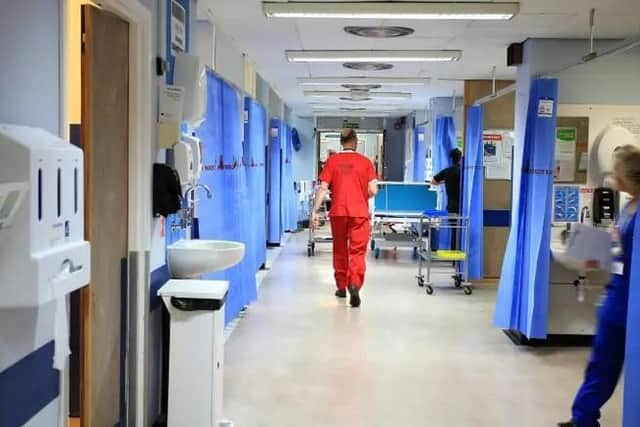Mid Yorkshire Hospitals Trust: More than 40,000 patients waiting for routine treatment
and live on Freeview channel 276
The Society for Acute Medicine said the current picture across the NHS in England – where 6.5 million people are waiting to start treatment – is "unacceptable and unsustainable" for patients and staff.
NHS England figures show 40,476 patients were waiting for non-urgent elective operations or treatment at Mid Yorkshire Hospitals NHS Trust at the end of April – up slightly from 40,254 in March, and 33,585 in April 2021.
Of those, 983 (2%) had been waiting for longer than a year.


Advertisement
Hide AdAdvertisement
Hide AdThe median waiting time from referral at an NHS Trust to treatment at Mid Yorkshire Hospitals Trust was 10 weeks at the end of April – up from nine weeks in March.
Nationally, 6.5 million people were waiting to start treatment at the end of April.
Dr Tim Cooksley, president of the SAM, said the healthcare workforce and its capacity are currently the key issues facing the NHS, but that the latest figures show there is no easy solution.
He added: “The current experience for patients with long waits for both emergency and elective care is intolerable and this is causing significant morale injury to clinical and operational staff in NHS and social care who wish to provide high quality care for patients.
Advertisement
Hide AdAdvertisement
Hide Ad“The current situation is unacceptable and unsustainable for patients and staff.
"It is essential that the Government urgently commits itself to the long-term solutions.”
Some 12,735 people were waiting more than two years for hospital treatment at the end of April – nearly five times the number waiting in April last year, but down from a record 23,778 in January.
The Royal College of Surgeons of England said this shows "light at the end of the tunnel".
Advertisement
Hide AdAdvertisement
Hide AdTim Mitchell, vice president of the organisation, said: “Surgical teams have been working around the clock to reduce the enormous waiting list which built up during the pandemic.
“However, there are still big challenges ahead. As people return to the NHS, demand is only getting stronger.”
The Government has set the ambition to eliminate all waits of more than two years, except when it is the patient’s choice, by July of this year.
Separate figures show 1.5 million patients in England were waiting for a key diagnostic test in April – a fall from 1.6 million in March.
Advertisement
Hide AdAdvertisement
Hide AdAt Mid Yorkshire Hospitals Trust, 11,397 patients were waiting for one of 12 standard tests, such as an MRI scan, non-obstetric ultrasound or gastroscopy at this time.
Of them, 1,784 (16%) had been waiting for at least six weeks.
Other figures show cancer patients at Mid Yorkshire Hospitals Trust are not being seen quickly enough.
The NHS states 85% of cancer patients urgently referred by a GP should start treatment within 62 days.
Advertisement
Hide AdAdvertisement
Hide AdBut NHS England data shows just 74% of patients urgently referred by the NHS who received cancer treatment at Mid Yorkshire Hospitals Trust in April began treatment within two months of their referral.
That was up from 73%in March, but down from 79% in April 2021 last year.
Professor Sir Stephen Powis, national medical director for NHS England, said the NHS still faces pressures, but added: "Hard-working NHS staff are making significant progress in ensuring people waiting the longest time for care are getting treated."
The Department of Health and Social Care said it is tackling the Covid backlog and rising demand for the NHS with record investment.
A spokesman added: “Good progress is being made on cutting waiting times with a two thirds reduction in the number of patients waiting longest for treatment since February."